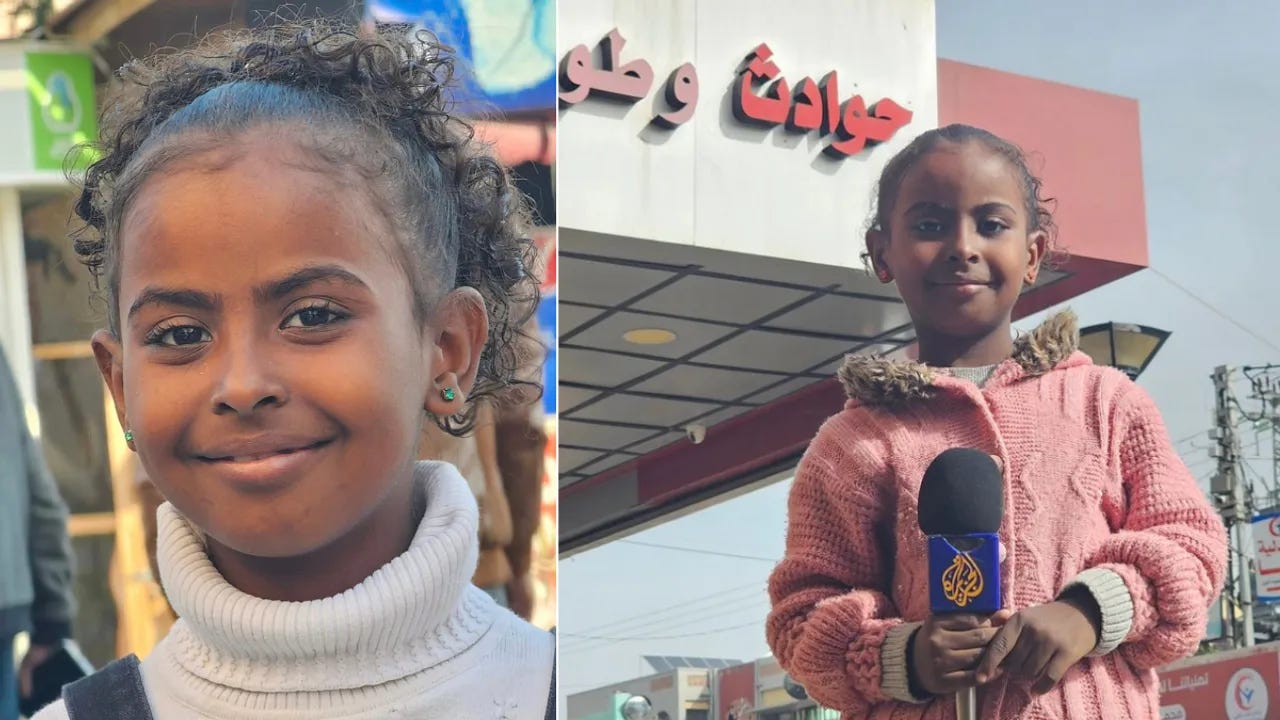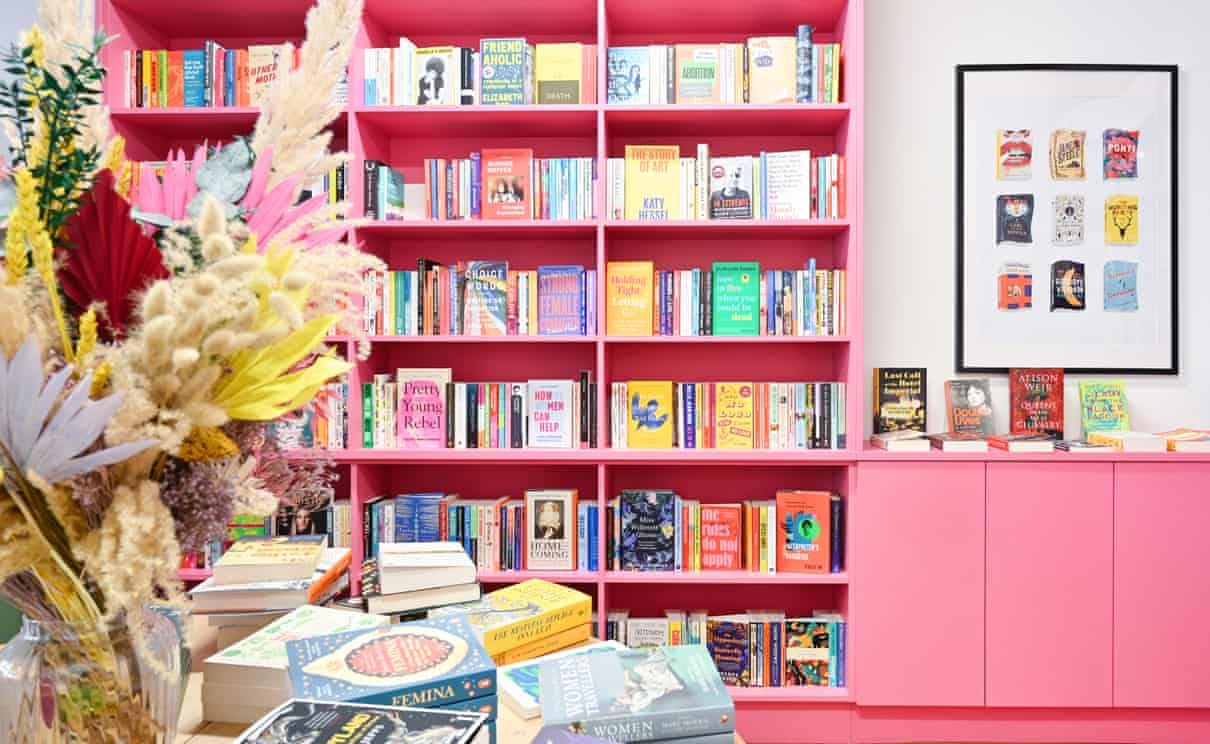Global Roundup: Youngest Palestinian Journalist, Kashmiri Women Rappers, Mexican ‘Nuns’ Reclaiming Cannabis, Cambodian Women Tuk-Tuk Drivers, Women-Centered European Bookstores
Curated by FG Contributor Inaara Merani
Image: Lama Jamous Instagram. (She the People)
Lama Jamous is the youngest journalist from Palestine, bravely reporting on the genocide that Israel is committing in Gaza and spreading awareness through her eyes, on social media. Jamous, who is just nine years old, has accumulated over 600 thousand followers on social media.
In her videos, Jamous is seen walking around hospitals and refugee camps speaking with individuals and being a voice for the people. After recording her videos, she then uploads to Instagram. She is a voice for Gaza’s most vulnerable population that is suffering most from this genocide: the Palestinian children.
A child reporting on a genocide taking place against her people should make a clear statement about the reality of the situation, yet most western media outlets, political bodies, and organizations fail to report accurately, or even at all, on the genocide, instead only focusing on Israel’s “self-defence”. Jamous, however, is not afraid to openly call out the genocidal tactics of Israel. In one instance, she says that she wants to “show and make it clear to the world that the children of Palestine are being tortured. There is no food and drinks. They don’t have anything.”
The young journalist has shown that with the right motives and guidance, social media can be used as a key tool for anyone in many different capacities. In addition to reporting on the genocide taking place in Gaza, Jamous has also interviewed locals, authorities, doctors, and humanitarians. She has also collaborated with other Palestinian reporters, including journalist Wael Al Dahdouh, the much-loved Al Jazeera’s Gaza bureau chief who lost several members of his family to Israel’s genocide and who himself has been severaly injured and yet has fearlessly reported over the last several months as well. Below is Jamous’ interview of Al Dahdouh, from her Instagram account.
(Feminism in India)
Female MCs in Kashmir are challenging the hip-hop scene that is dominated by men. In a society that relies heavily on gender norms and stereotypes, these artist are breaking free of societal expectations and are welcoming in a new era of self-expression and empowerment through rap.
In the early 2000s, many Kashmiri youth began experimenting in the hip-hop genre. They began to infuse traditional Kashmiri elements into the beats and rhymes which created a unique fusion that resonated with people. In a region with a long history of social issues and conflict, Kashmiri youth found that many of the struggles experienced by Kashmiri society blended seamlessly with the ethos of hip-hop.
Now, after the genre has been dominated by men, female MCs are starting to make their way into the Kashmiri hip-hop scene. Artists such as Anam Nasir, Mehak Ashraf, and Iqra Nisar have broken barriers and inspired a new generation of women artists in Kashmir. In their lyrics, female MCs rap about the beauty of their homeland, the struggles faced by women in Kashmir, and the societal constraints that they aim to shatter. The combination of global hip-hop influences with local Kashmiri elements has given rise to a distinctive genre that speaks directly to the people.
Primarily, women connect with the lyrics written by female hip-hop artists, and only a few rappers who genuinely grasp and value talent extend their support. Others are resistant to our progress in the hip-hop field. – Anam Nasir
These female MCs’ emergence signifies a transformative shift in Kashmir’s hip-hop scene and as they continue to make their music they are paving the way for empowerment and resilience for many young women to follow.
A member of Sisters of the Valley, who uses the moniker ‘Sister Bernadet’ online and asked to not give her name for fear of reprisal, smokes a joint at the Sisters of the Valley’s farm on the outskirts of a village in central Mexico. [Raquel Cuna/Reuters]. (Al-Jazeera)
Sisters of the Valley is an international group which has pledged to spread the word about the health benefits and healing powers of cannabis. Founded in 2014, the group made over $500,000 last year. Sisters of the Valley has seen success in its small business ventures in the US, seeking CBD tinctures, oils, and salves online.
The group is fashioned after a lay religious movement, the Beguines, from the Middle Ages. Made up of single women, the group devoted itself to spirituality, scholarship, and charity and took no formal vows. Globally, the sisters say they wear these outfits to project uniformity and respect for the plant, but they are also aware that it draws media attention. Despite dressing in nun’s attire, these women are not Catholic or part of any other religion.
The same success has not come easily for all women around the world; in Mexico, women have had different experiences with entering the cannabis world in a highly Christian society and where a drug war has ravaged the country. Just the image of a nun smoking marijuana is an act of rebellion, however, this has not stopped the sisters from posting on social media where they are seen caring for cannabis crops, giving workshops, and attending cannabis-related events.
Product sales in Mexico amount to around $10,000 annually, only a fraction of US annual sales. Although the group is quite prominent online, the five sisters running the group in Mexico do not like to give out too much information about the location of their operations. Legally, cannabis is still a gray area in Mexico, and much of the country’s production is still tied to criminal organizations.
The Sisterhood is in a totally different context here in Mexico – because of how religious the country is and because of the plant’s ties to cartels…We want to take the plant back from the narcos. – Sister Bernadet
The small group of five women meet on weekends where they grow and produce their products, which are then sold. They also meet with other individuals in Mexico City who are pushing for full legalization of cannabis, and host workshops about everything weed-related. Many Sisters of the Valley members have become estranged from family members and friends who find their work rebellious, but their mission is clear, as Sister Kiki says, “It’s time to put an end to this stupidity.”
Women tuk-tuk drivers waiting for passengers near the terrace of the elephants at the Angkor complex in Siem Reap province, Cambodia. [Tang Chhin Sotho/AFP]. (Al Jazeera)
In Cambodia, legal and practical steps have been taken towards gender equality, but, society remains highly conservative and patriarchal. Gender roles and norms are heavily enforced, and women are often expected to engage in domestic work instead of seeking out paid work. However, women in Cambodia have defied these norms and are fighting prejudice by working as tuk-tuk drivers in Siem Reap province.
Roeung Sorphy, who goes by Sopy, began her career as a tuk-tuk driver over three years ago but had difficulty integrating with male tuk-tuk drivers. She got her start after borrowing $3000 to buy her tuk-tuk, and has since made a living by giving passengers rides, including a $15 tour tour around Angkor, the UNESCO World Heritage site. After years, she says, her male colleagues finally accepted her.
At first, they [male drivers] looked down on me…They said we women should stay at home and clean dishes. But we keep persevering…We cannot just rely on husbands. We will be strong like men. – Roeung Sorphy (Sopy)
Tuk-Tuks are Cambodia’s most popular and convenient means of transportation. The Independent Democracy of Informal Economy Association, an NGO, estimates that there are tens of thousands of tuk-tuk drivers across the country.
Kim Sokleang, better known as ‘Tuk-Tuk Lady’, founded the Siem Reap Remarque Driver Association last year to help women in the male-dominated field. The group includes 20 women drivers, six of whom are single mothers. Kim would like to see more women take up the career. One day, after her team members retire, she plans to open a tuk-tuk restaurant.
Rare Birds in Edinburgh, where ‘every inch of shelf space’ is devoted to women’s writing. Photograph: Julie Howden. (The Guardian)
Six years ago in Scotland, Rachel Wood launched a book subscription service in an effort to champion women’s writing. The service, Rare Birds, offered customers the opportunity to read books created by women, many of which do not get the attention that they deserve.
I feel so passionately that women are writing such interesting and exciting things. Rare Birds is an opportunity to share that with other people. – Rachel Wood
Over the years, the company has developed a worldwide client base, with members from more than 20 countries, which was followed by the opening of a bricks-and-mortar bookstore in Edinburgh in 2021. On the store’s opening weekend, thousands of people visited the store, demonstrating the demand for a different kind of bookstore.
Over and over, people tell us how exciting it feels to come into the bookstore and see every inch of shelf space devoted to women’s writing. Visually, it’s very impactful. – Rachel Wood
Rare Birds is joined by a number of other book stores which have recently opened in Europe, featuring only women and/or queer authors. These include She Said bookshop in Berlin which is dedicated to books by female and queer authors, Greta Livraria in Lisbon which offers books from diverse perspectives, as well as Mujeres & Compañia bookshop in Madrid which opened in 2017 after a crowdfunding campaign.
Inaara Merani (she/her) recently completed her Masters degree at the University of Western Ontario, studying Gender, Sexuality, and Women’s Studies with a specialization in Transitional Justice. In the upcoming years, she hopes to attend law school, focusing her career in human rights law.
Inaara is deeply passionate about dismantling patriarchal institutions to ensure women and other marginalized populations have safe and equal access to their rights. She believes in the power of knowledge and learning from others, and hopes to continue to learn from others throughout her career.







